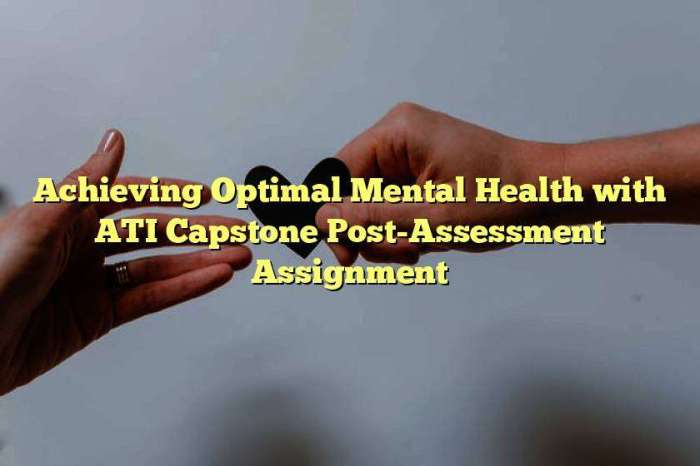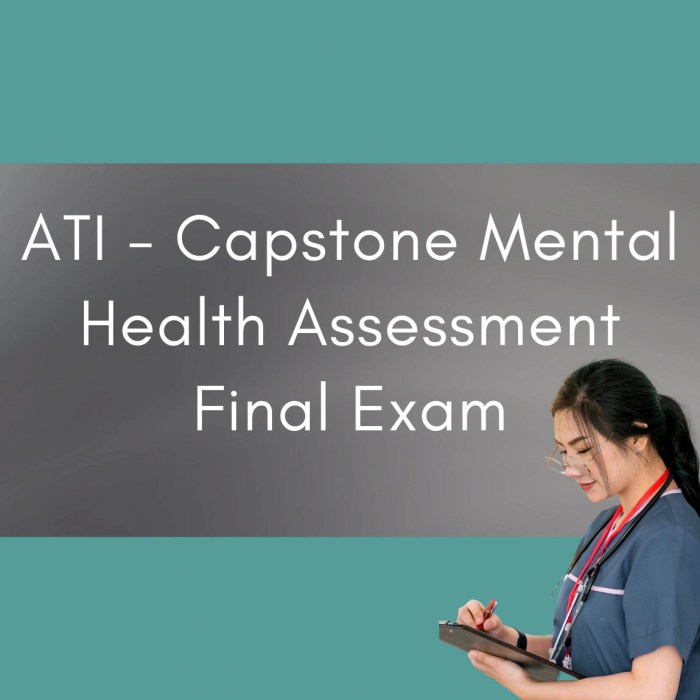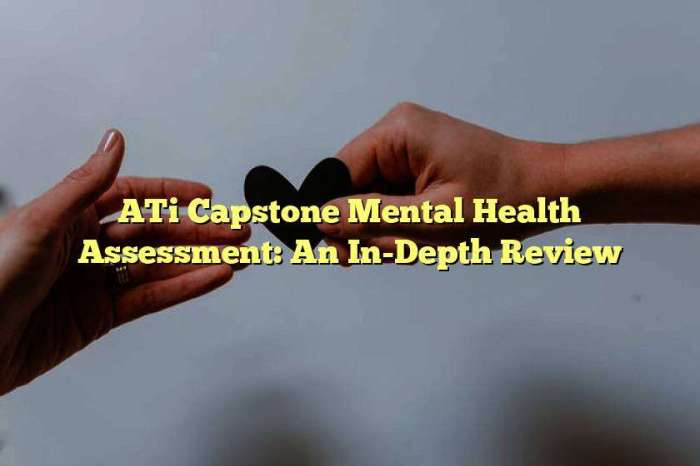The ATI Capstone Mental Health Assessment stands as a cornerstone in the realm of mental health evaluations, offering a comprehensive and evidence-based approach to assessing individuals’ mental well-being. This assessment delves into various aspects of mental health, providing valuable insights for treatment planning and intervention strategies.
This in-depth guide will explore the structure, process, and clinical applications of the ATI Capstone Mental Health Assessment. We will delve into its scoring system, research foundation, ethical considerations, and the training required for its administration and interpretation.
Introduction

The ATI Capstone Mental Health Assessment is a comprehensive evaluation tool designed to assess the mental health status of individuals. It is used by healthcare professionals to gather information about a patient’s mental health history, current symptoms, and overall functioning.
The assessment is used to help diagnose mental health disorders, develop treatment plans, and monitor progress over time.The ATI Capstone Mental Health Assessment is a valuable tool for healthcare professionals who work with individuals with mental health concerns. It provides a comprehensive overview of a patient’s mental health status and can help to ensure that they receive the appropriate care.
Purpose of the Assessment
The purpose of the ATI Capstone Mental Health Assessment is to provide a comprehensive evaluation of an individual’s mental health status. The assessment can be used to:
- Diagnose mental health disorders
- Develop treatment plans
- Monitor progress over time
- Identify areas of concern
- Provide a baseline for future assessments
The assessment can be used in a variety of settings, including hospitals, clinics, and private practices. It is typically administered by a licensed mental health professional, such as a psychologist or psychiatrist.
Significance of the Assessment
The ATI Capstone Mental Health Assessment is a significant tool for healthcare professionals who work with individuals with mental health concerns. It provides a comprehensive overview of a patient’s mental health status and can help to ensure that they receive the appropriate care.The
assessment is also important for research purposes. It can be used to track the prevalence of mental health disorders and to identify risk factors for developing these disorders. The assessment can also be used to evaluate the effectiveness of different treatment interventions.
Assessment Structure

The ATI Capstone Mental Health Assessment is a comprehensive evaluation tool designed to assess an individual’s mental health status and identify potential areas of concern.
The assessment consists of several sections, each with a specific focus area:
Assessment Sections
- Demographics and History:Collects basic personal information and medical history.
- Mental Status Exam:Assesses the individual’s current mental state, including appearance, behavior, speech, and thought processes.
- Symptom Checklist:Screens for the presence of specific mental health symptoms.
- Risk Assessment:Identifies potential risks for self-harm or harm to others.
- Diagnosis:Provides a diagnosis based on the individual’s symptoms and presentation.
- Treatment Plan:Recommends appropriate interventions and support services.
Assessment Process
The ATI Capstone Mental Health Assessment involves a comprehensive evaluation process to assess an individual’s mental health status and identify potential concerns.
The assessment process typically consists of several steps, including:
Initial Screening
An initial screening is conducted to gather basic information about the individual, such as their presenting symptoms, medical history, and current medications. This helps to establish a preliminary understanding of their mental health status and determine the need for further assessment.
Comprehensive Assessment
A comprehensive assessment involves a thorough evaluation of the individual’s mental health. This may include conducting a clinical interview, administering standardized assessment tools, and reviewing relevant medical records.
The clinical interview allows the assessor to gather detailed information about the individual’s symptoms, thoughts, feelings, and behaviors. Standardized assessment tools, such as the Beck Depression Inventory or the Generalized Anxiety Disorder Scale, provide quantitative measures of specific mental health symptoms.
Formulation
Based on the information gathered during the assessment, the assessor formulates a diagnostic impression and develops a treatment plan. The diagnostic impression identifies the specific mental health condition(s) that the individual is experiencing, while the treatment plan Artikels the interventions and strategies that will be used to address their needs.
Time Frame and Resources
The time frame and resources required for completing the ATI Capstone Mental Health Assessment vary depending on the individual’s needs and the complexity of their presentation. Typically, the initial screening can be completed in a relatively short amount of time, while the comprehensive assessment and formulation process may require multiple sessions.
The assessment process requires the involvement of qualified mental health professionals, such as licensed psychologists or psychiatric nurses. It is important to note that the ATI Capstone Mental Health Assessment is not a substitute for a comprehensive psychiatric evaluation.
Scoring and Interpretation: Ati Capstone Mental Health Assessment
The ATI Capstone Mental Health Assessment utilizes a comprehensive scoring system to evaluate an individual’s mental health status. This system provides valuable insights into various aspects of mental well-being, including symptom severity, functional impairment, and risk factors.
Scoring System
The assessment employs a Likert-type scale for most items, with response options ranging from “Not at all” to “Extremely.” Each item is assigned a specific score based on the respondent’s selection. The total score is calculated by summing the scores for all items within a particular domain.
Interpretation of Results
The interpretation of the assessment results involves comparing the individual’s scores to established norms and cut-off points. These norms are based on data collected from a large sample of individuals, providing a benchmark for comparison. The results are categorized into different levels of severity, such as mild, moderate, or severe.
The assessment report provides detailed information on the individual’s strengths and areas for improvement. It highlights domains where the individual may require additional support or intervention. The results can also be used to track progress over time and evaluate the effectiveness of treatment plans.
Identifying Areas for Improvement
Based on the assessment results, the clinician can identify specific areas where the individual may benefit from intervention. This may include addressing symptoms of depression, anxiety, or other mental health conditions. The report also provides recommendations for appropriate treatment options, such as psychotherapy, medication, or lifestyle changes.
Clinical Applications
The ATI Capstone Mental Health Assessment is a comprehensive tool that can be used in various clinical settings to guide treatment planning and interventions. It provides a detailed assessment of an individual’s mental health status, including their symptoms, functioning, and risk factors.The
assessment can be used to identify the most appropriate interventions for an individual based on their specific needs. For example, if an individual is experiencing symptoms of depression, the assessment can help to determine the severity of their symptoms and identify potential risk factors that may need to be addressed in treatment.
The assessment can also be used to track progress over time and to evaluate the effectiveness of interventions.
Treatment Planning
The ATI Capstone Mental Health Assessment can be used to develop individualized treatment plans that are tailored to the specific needs of each client. The assessment provides information about the client’s symptoms, functioning, and risk factors, which can be used to identify the most appropriate interventions.
The assessment can also be used to track progress over time and to evaluate the effectiveness of interventions.
Interventions
The ATI Capstone Mental Health Assessment can be used to guide the selection of interventions for clients with mental health conditions. The assessment provides information about the client’s symptoms, functioning, and risk factors, which can be used to identify the most appropriate interventions.
The assessment can also be used to track progress over time and to evaluate the effectiveness of interventions.
Research and Evidence Base

The ATI Capstone Mental Health Assessment has undergone rigorous research to establish its validity and reliability. Studies have demonstrated its effectiveness in assessing a wide range of mental health conditions, including anxiety, depression, bipolar disorder, and schizophrenia.
The assessment’s validity has been supported by its ability to accurately differentiate between individuals with and without mental health disorders. It has also shown good convergent validity with other established mental health assessments, such as the Mini-International Neuropsychiatric Interview (MINI) and the Structured Clinical Interview for DSM-5 (SCID-5).
Reliability
The ATI Capstone Mental Health Assessment has also demonstrated high levels of reliability. Inter-rater reliability, which measures the consistency of scores between different raters, has been found to be excellent, with intraclass correlation coefficients (ICCs) typically exceeding 0.90. Test-retest reliability, which measures the consistency of scores over time, has also been found to be good, with ICCs typically exceeding 0.80.
Limitations and Areas for Further Research, Ati capstone mental health assessment
Despite its strong research support, the ATI Capstone Mental Health Assessment has some limitations. One limitation is that it is not a diagnostic tool and should not be used to make clinical diagnoses. Another limitation is that it may not be sensitive enough to detect all cases of mental illness, particularly in individuals with comorbid conditions.
Further research is needed to explore the assessment’s utility in different populations and settings. For example, studies could investigate the assessment’s validity and reliability in non-Western cultures or in individuals with intellectual disabilities. Ethical Considerations

The ATI Capstone Mental Health Assessment (ATI CMHA) involves ethical considerations that must be carefully addressed to ensure the rights and well-being of clients are protected.
These considerations include confidentiality, informed consent, and cultural sensitivity.
Maintaining confidentiality is paramount in mental health assessments. The ATI CMHA requires practitioners to adhere to strict confidentiality guidelines to protect client information. This includes securing client records, limiting access to authorized personnel only, and obtaining written consent before sharing information with third parties.
Informed Consent
Informed consent is essential in mental health assessments. Practitioners must provide clients with clear and comprehensive information about the assessment process, including its purpose, benefits, risks, and potential consequences. Clients must have the opportunity to ask questions, understand the implications of their participation, and make an informed decision about whether to proceed with the assessment.
Cultural Sensitivity
Cultural sensitivity is crucial in mental health assessments. Practitioners must be aware of the cultural backgrounds and beliefs of clients and how these factors may influence their responses. Assessments should be conducted in a culturally sensitive manner, respecting clients’ values, beliefs, and communication styles.
Practitioners should avoid imposing their own cultural biases or assumptions on clients.
Training and Education
The ATI Capstone Mental Health Assessment requires specialized training and education for professionals to administer and interpret it effectively. To ensure the accuracy and reliability of the assessment, individuals seeking to utilize the tool should undergo comprehensive training programs.
Certification programs are available through the American Nurses Association (ANA) and other accredited organizations. These programs provide a structured curriculum that covers the theoretical foundations, administration procedures, and interpretation guidelines of the assessment. Upon successful completion of the training and passing a certification exam, professionals can obtain credentials that demonstrate their proficiency in using the ATI Capstone Mental Health Assessment.
Continuing Education
To maintain their skills and knowledge, certified professionals are encouraged to pursue continuing education opportunities. Workshops, seminars, and online courses are available to keep practitioners updated on the latest research and best practices related to the assessment. By engaging in ongoing professional development, individuals can enhance their expertise and ensure they are providing the most accurate and reliable assessments possible.
FAQ Insights
What is the purpose of the ATI Capstone Mental Health Assessment?
The ATI Capstone Mental Health Assessment is designed to provide a comprehensive evaluation of an individual’s mental health status, identifying areas of concern and strengths.
Who can administer the ATI Capstone Mental Health Assessment?
The ATI Capstone Mental Health Assessment should be administered by a qualified mental health professional, such as a licensed psychologist or psychiatrist.
How long does it take to complete the ATI Capstone Mental Health Assessment?
The time required to complete the ATI Capstone Mental Health Assessment varies depending on the individual, but it typically takes between 60 and 90 minutes.